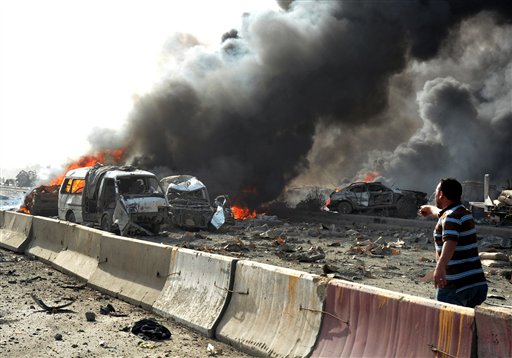Just back from a trip to Jordan where he met with both Jordanian and Russian officials, Senator JohnKerry–Chairman of the Senate Foreign Relations Committee–weighed in on the increasingly diresituation developing in Syria. He now advocates for arming and training Syrian opposition forces and forthe creation of “safe zones” within Syria for civilians. “I’m talking about Gulf States and the Arab Leagueengaging and leading on this with NATO perhaps as a support structure behind the scenes to back itup,” he said. When asked if he favors U.S. or NATO led airstrikes in support of the effort hesaid, “Sure.”
Republicans have accused the administration of a failure to lead or “leading from behind” in recentMiddle East conflicts in which the U.S. has been involved. Kerry responds “This ‘failing to lead’ refrainis just a political refrain,” he said. “The United States doesn’t have to go off and do everything to bethe leader. Actually, it’s pretty smart to get somebody else to do some things for you. You save theAmerican taxpayer a few dollars, you don’t put American troops at risk, and you get the job done.”
Time for another Kinetic Military Action, but leading from behind has come with unintendedconsequences, primarily child soldier and weapons proliferation. The United States has already beenunintentionally responsible for arming the Syrian rebels. On April 28th Lebanese intelligence officialsseized a ship with a massive weapons cargo originating in Tripoli, Libya and bound for the northernLebanese port of Tripoli, a center for Syrian rebel activity. The shipment included heavy machine guns,shells, rockets, rocket launchers, and other explosives–weapons which could dramatically increase theintensity of the conflict.
In fact, with no NATO or American troops on the ground to exert control, weapons from the Libyanconflict have flowed across the Middle East, including Egypt and Gaza, as well as to rebels in sub-SaharanAfrica. This includes anti-aircraft missiles which could change the face of the Palestinian-Israeli conflictand global terrorism generally. The $147 million dollars pledged by Obama for Palestinians islikely, at least in part, to go to additional purchases of these weapons. In Mali, weapons from the Libyanrevolution have enabled Taureg rebels to mount a new and successful offensive, culminating in a mutinyby outgunned Malian soldiers and resulting in a coup that has ended twenty years of democratic rule.
Senator Kerry said, “The concept of a safe zone is a reality and worth the discussion”. A safe zone is areality, but in the past it has been referred to as occupied territory, the borders of which are knownas war fronts. When Senator Kerry talks about Gulf States and the Arab league leading with the U.S. orNATO in a support role, what he is really saying is that the United States should militarily support theinvasion and occupation of Syria by neighboring Middle East states.
There are several dangers in becoming directly involved with the Syrian Civil War. The possibility of thisconflict devolving into a regional sectarian war is very real. President Assad is an Alawi Shia, the minorityIslamic sect in Syria. The rebels are Sunni, the majority. Kurds and Christians are caught in the middle.Neighboring countries– Lebanon, Turkey and Iran– are demographically similar, and a prolonged conflictis likely to cross borders, pulling the U.S. into a broader regional conflict which would be very difficultto disentangle ourselves from. This would be a development beyond the ability of the U.S. or NATO tocontrol and would require more than leading from behind.
Additionally, Al Qaeda appears to be responsible for yesterday’s bombings in Damascus which killed70 people and injured another 400. Al Qaeda has previously been supportive of Syria’s efforts tooppose America in Iraq. This change in dynamic further muddies the waters. Secretary of Defense Leon Panetta acknowledged the presence of Al Qaeda in Syria but said the extent of their involvement is unclear,seemingly contradicting Obama’s Afghanistan victory lap statement that their defeat is, “now within ourreach”. This in fact would put America and Al Qaeda on the same side of this war.
Further complicating the situation, both China and Russia are supporting the Assad regime and appearto be taking more of a cold war stance globally. Not merely protecting economic interests, Russia has$5 billion in weapons contracts with Damascus and another $20 billion in private investment; there isa real strategic interest at stake. Russia’s only naval base on the Mediterranean is in the port city ofTartus Syria and is currently being refurbished. And just last week Russia threatened pre-emptive strikesagainst NATO if the U.S. installs a missile shield in Europe.
Meanwhile Putin has been busy stomping out his own pro-democracy protests in Moscow, arrestingmore than four hundred demonstrators at an anti-Putin demonstration that was over twenty thousandstrong just last week. It is unlikely he will pivot his attention to resolving the Syrian conflict in the nearterm.
China is one of Syria’s largest importers, and the two countries have a long history of mutual supporton international issues. For China, Syria is just one of many areas of contention with the United States–shielding North Korea’s nuclear ambitions, Taiwan, and claiming the South China Sea to name a few.The latter has caused the Obama administration to open a Marine base in northern Australia as acontingency against China closing major shipping lanes in the region.
As politicians line up to get on the right side of history, and the Obama administration bides it’s timehoping Kofi Annan can, as Senator Kerry put it, pull a rabbit out of his hat, it should be recognized thatthis conflict is likely to have regional and global implications. American involvement intending to avert alocal humanitarian crisis could end up creating an international one, as did our involvement in Libya.

COMMENTS
Please let us know if you're having issues with commenting.